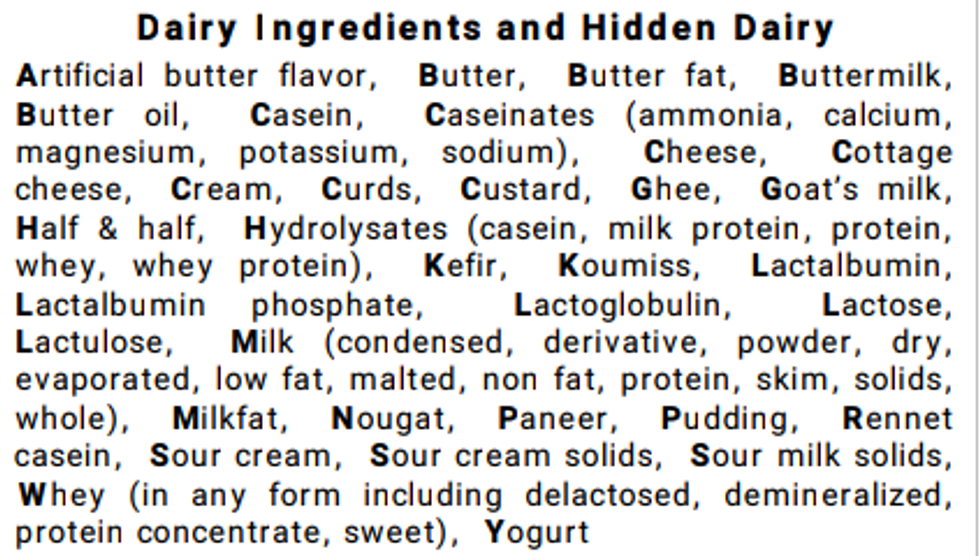Be careful what you eat. A lot of foods that claim to be 'dairy-free' and 'allergen-free' are tricking you. Even if they don't say 'May contain x and y', check the ingredients before you eat because some of these foods are not what they seem.
For anyone allergic to dairy or knows someone who is, keep these terms in mind in case a food tries to slip in some dairy byproducts that could still cause a reaction:
Here are some of the foods that claim to be allergy friendly but are actually not.
I Can't Believe It's Not Butter
Well, it's less butter. If you flip the container of this popular butter substitute around and look at the bottom of the ingredients, it clearly says in bold Contains Milk and Soy. Actually, it is very common for margarine to contain some small amount of butter in them. One of the few types of margarine I have found to be completely oil, no dairy, is Country Crock Original.
Non-Dairy Creamer
These literally say non-dairy in the name, but most contain a milk derivative in them called caseinate. This is like when foods contain whey protein, the main protein extracted from milk, and the reason I can't eat energy bars. Don't assume that just because something says non-dairy in the name that it is dairy free.
Dairy Free Ice-cream
Ben & Jerry's dairy-free ice-cream is dairy free for once, but it's not allergen free. I was excited when they came out with this, hoping I could eat it, but for any friends out there with nut allergies, this ice-cream is made with almond milk. A good alternative would be the brand So Delicious that makes coconut milk ice-cream to die for, but if you can't have coconut that is also a no go. At that stage, all I can recommend is sorbet, but only sorbet. Keep this in mind:
Ice cream: milk
Sherbert: milk, fruit, and ice
Sorbet: only fruit and ice
Lactose-free Milk
This is lactose free like it says. Which is great for people that are lactose intolerant. But intolerant is not the same as an allergy. Some people are allergic to the whey protein in milk instead, and therefore lactose-free milk will still give them a reaction. Here is the difference.
Lactose intolerance has to do with people being unable to digest lactose. This means your body doesn't make or doesn't make enough lactase, the enzyme needed to digest lactose. Therefore, it has to be broken down not in the stomach, but in the colon, which causes gas that is uncomfortable but not dangerous.
Dairy allergies have to do with the immune system, much like all other allergies. If the protein in milk is ingested, the body reacts to it like a foreign invader, releasing substances to fight it off and cause an allergic reaction. This can appear anywhere from mild reactions such as itching and rashes, to extreme ones, such as trouble breathing. But considering that the human body isn't originally built to have milk after babyhood, this allergy is common in kids.
Chocolate
Don't just assume that milk chocolate is the only chocolate with milk in it! In fact, white chocolate doesn't contain any cocoa in it, only cocoa butter. Dark chocolate you can eat more easily, because the darker you get, the less milk is added to the chocolate to sweeten it. For a chocolate to be 'vegan' aka have so little dairy in it that it is considered to have no animal products, it needs to be at least 55-85% cocoa.
I was very disappointed when I realized I was allergic to milk because caramel and nougat are basically just sugar and milk. I can't have nachos or pizza because of the cheese on them. However, soy lattes are actually tastier to me because soy milk is sweeter than normal milk, and I love my latte a lot-te sweeter than most people. So don't give up trying to find alternatives my allergy-having friends. Just make sure to reads or ask ingredients before assuming food is safe to eat.




















